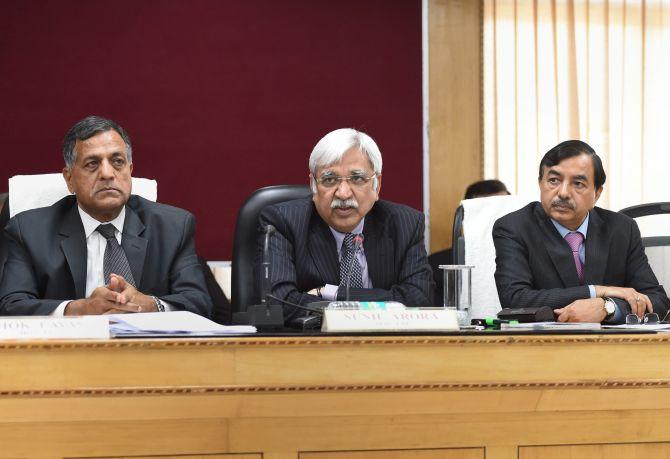Intermediary platforms would take down content that violates the code of conduct in 'real time', once they receive a legal notice from the EC officers tasked with looking at content violations, reports Neha Alawadhi.

The Indian industry body representing big technology companies like Google, Facebook, and Twitter will train State Election Commission (SEC) officers as well as work with members who will take down content that is flagged through a legal notice, the Internet and Mobile Association of India (IAMAI) said.
The EC on Sunday announced the model code of conduct, and said social media platforms had committed to ensure a monitoring mechanism to help check issues that may compromise the election exercise.
It also said it was working with industry body IAMAI to formulate a code of ethics for intermediary online platforms, of which the most notable are social media firms.
"We have had discussions with the EC to train state election officers and help them with their main thrust of bringing new voters to take part in the upcoming general elections," said Subho Ray, president at IAMAI.
He added that intermediary platforms would take down content that violates the code of conduct in 'real time', once they receive a legal notice from the EC officers tasked with looking at content violations.
The Supreme Court in 2015 had read down a Section of the Information Technology (IT) Act, 2000, to say that an intermediary will only take down content if specified by a court order or a notification by the appropriate government or its agency.
In a bid to make this task perhaps easier, the EC had asked for the inclusion of a clause in proposed changes to India’s intermediary IT laws.
The EC had asked that a clause be added to the proposed rules, so they apply to 'violation of any of the provisions of election law or/and directions of the EC, during the period of any election'.
In counter-comments submitted by different stakeholders, several entities disagreed with the EC’s demand and said the existing laws were enough to deal with the electoral processes, and do not require a modification in the IT Act.
The proposed changes are yet to be finalised.
Silent period restrictions
In addition, Chief Election Commissioner Sunil Arora also said that the silent period which kicks in 48 hours before polling, will be applicable to social media platforms as well.
Section 126 of the Representation of the People Act prohibits advertising and campaigning on television and other electronic media during the 'silent period', which is 48 hours before elections in a given area.
"We will enforce silent periods for ads on Google platforms," said a Google spokesperson.
Facebook and Twitter did not respond to a request for comment.
It is important to make the distinction between advertisements and content posted on social media platforms. While advertisements are paid for, content posted by individual profiles are usually not.
Another issue is that of dealing with content removal at a geographical level.
For example, West Bengal is going to polls in seven phases, and in an online scenario, blocking ads or taking down content at a city or block level is not an easy task.
Hence, content removal based on complaints made by people and requested by the EC in real time is a more feasible method.
Also, while blocking content on websites by geotagging or selectively making content available in a specific geographic location is easier, doing so for mobile apps is a far more complex issue.
Gearing up for big day
- EC has said Google, Facebook, Twitter and YouTube have been asked to verify advertisements coming from political parties.
- Political ads on social media will require pre-certification from the Media Certification and Monitoring Committees of EC at State and district levels.
- Facebook and Twitter have started disclosing the ad spend by political parties.
- All candidates will provide details of their social media accounts while filing their nomination papers for the national election.












 © 2025 Rediff.com -
© 2025 Rediff.com -